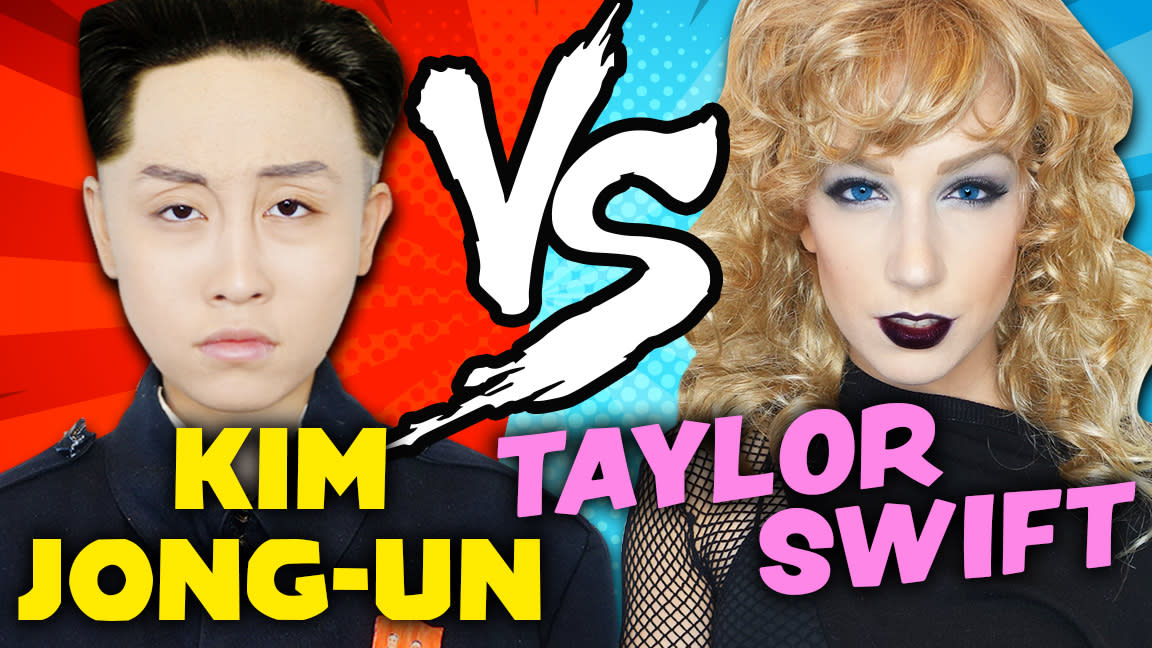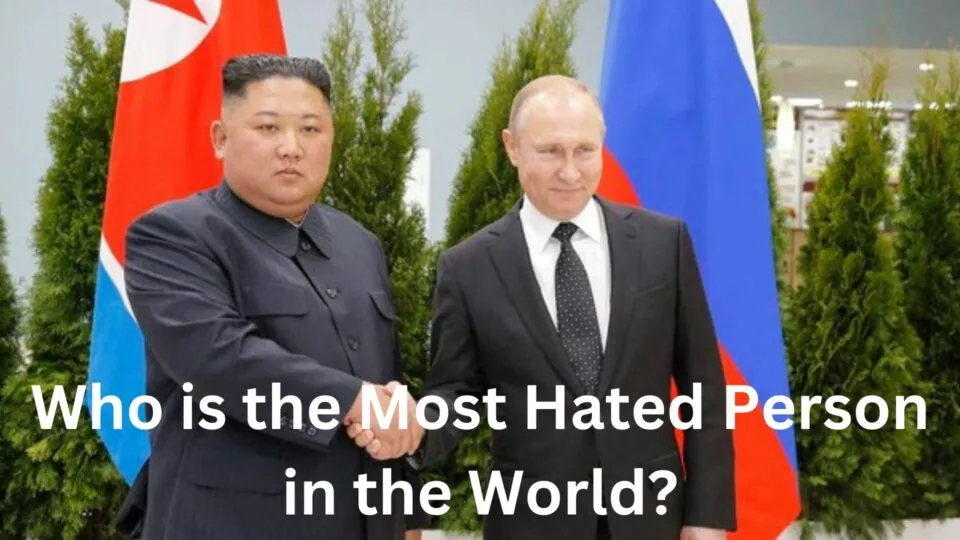The Most Hated Person In The World: A Comprehensive Exploration
The concept of "the most hated person in the world" has fascinated and intrigued many people across the globe. It delves into human psychology, societal values, and historical contexts. In this article, we will explore who is considered the most hated person and why their actions or beliefs have garnered such strong negative reactions.
From political figures to celebrities, there are individuals whose decisions and actions have sparked global outrage. Understanding why someone is hated requires examining not only their behavior but also the cultural, political, and social environments in which they operate. This article aims to shed light on this controversial topic while providing balanced and well-researched insights.
By the end of this article, you will gain a deeper understanding of the factors that contribute to someone becoming the most hated person in the world. Let us embark on this journey together and explore the complexities of human emotions and perceptions.
Read also:Taylor Swift Travis Kelce And Vince Gill A Closer Look At Celebrity Friendships And Fan Reactions
Table of Contents
- Biography of the Most Hated Person
- Factors Contributing to Hatred
- Historical Context of Hatred
- Public Opinion and Perception
- Psychological Aspects of Hatred
- Hated Celebrities and Their Impact
- Political Figures and Controversy
- The Role of Media in Shaping Opinions
- Consequences of Being the Most Hated Person
- Conclusion and Final Thoughts
Biography of the Most Hated Person
Throughout history, certain individuals have been labeled as the most hated person in the world due to their actions, ideologies, or influence. Below is a brief overview of one such individual whose name often surfaces in this context.
Data and Information
| Name | Varying depending on context |
|---|---|
| Birthplace | Varying depending on context |
| Occupation | Politician, Celebrity, or Influencer |
| Notable Actions | Controversial decisions, public statements, or ideologies |
While the title of the most hated person varies depending on time and region, certain figures like Adolf Hitler, Kim Jong-un, or even controversial celebrities have garnered significant hatred globally. Their actions have left lasting impacts on society and history.
Factors Contributing to Hatred
Understanding why someone becomes the most hated person involves examining various contributing factors. These include:
- Political Decisions: Leaders who implement policies that harm their citizens or neighboring countries often face widespread hatred.
- Public Statements: Controversial or offensive remarks can alienate large portions of the population.
- Cultural Differences: Misunderstandings or disrespect toward different cultures can fuel resentment.
- Media Influence: Sensationalized coverage by the media can amplify negative perceptions.
These factors, among others, play a crucial role in shaping public opinion and determining who is perceived as the most hated person.
Historical Context of Hatred
Hatred is not a new phenomenon; it has existed throughout human history. In ancient times, leaders who waged wars or oppressed their people were often despised by their subjects. For example, figures like Nero, the Roman Emperor, were infamous for their cruelty and extravagance.
Modern-Day Examples
In modern times, political figures such as Adolf Hitler and Saddam Hussein have been labeled as some of the most hated individuals in history. Their actions during their respective regimes led to immense suffering and loss of life, cementing their place in infamy.
Read also:Live Updates Monitoring Severe Storms In Kentucky And Southern Indiana
Public Opinion and Perception
Public opinion plays a significant role in determining who is considered the most hated person. Surveys and polls conducted globally often reveal varying results based on geographical location and cultural background.
For instance, a person may be hated in one country but revered in another due to differing political ideologies or historical ties. This highlights the subjective nature of hatred and its dependence on context.
Psychological Aspects of Hatred
From a psychological perspective, hatred is a complex emotion that arises from a combination of factors. It can stem from fear, envy, or a desire for revenge. Understanding these underlying causes can provide insight into why certain individuals become targets of hatred.
Effects on Mental Health
Hatred not only affects the person being hated but also those harboring the emotion. Studies have shown that prolonged hatred can lead to increased stress, anxiety, and even physical health problems. Promoting empathy and understanding is crucial in combating hatred and fostering a more harmonious society.
Hated Celebrities and Their Impact
Celebrities often find themselves at the center of controversy due to their high visibility and public personas. Figures like Kanye West, Britney Spears, or even historical figures like Marilyn Monroe have faced significant backlash at various points in their careers.
Reasons for Celebrity Hatred
- Personal Behavior: Scandals or controversial behavior can tarnish a celebrity's reputation.
- Artistic Choices: Some fans may dislike changes in a celebrity's artistic direction or style.
- Media Portrayal: Negative media coverage can skew public perception of a celebrity.
Despite this, it is important to remember that celebrities are human beings with flaws and imperfections, much like the rest of us.
Political Figures and Controversy
Political figures often face intense scrutiny and criticism due to their positions of power and influence. Leaders who make unpopular decisions or engage in corrupt practices are frequently labeled as the most hated person in their respective countries.
Examples of Hated Political Figures
Figures like Kim Jong-un of North Korea or Bashar al-Assad of Syria have been criticized globally for their oppressive regimes and human rights violations. Their actions have resulted in widespread suffering and have made them targets of international condemnation.
The Role of Media in Shaping Opinions
The media plays a pivotal role in shaping public opinion and perceptions of individuals. Sensationalized reporting and biased coverage can amplify negative sentiments toward certain figures, contributing to their status as the most hated person.
Responsible Journalism
It is essential for journalists and media outlets to practice responsible journalism by presenting balanced and factual information. This helps prevent the spread of misinformation and ensures that public opinions are based on accurate data.
Consequences of Being the Most Hated Person
Being labeled as the most hated person can have severe consequences for an individual. These include:
- Isolation: Social and political isolation from the global community.
- Economic Sanctions: Economic repercussions for their countries or businesses.
- Personal Safety: Threats to personal safety and well-being.
These consequences highlight the gravity of being perceived as the most hated person and the importance of responsible leadership and behavior.
Conclusion and Final Thoughts
In conclusion, the concept of the most hated person in the world is complex and multifaceted. It involves examining historical, cultural, and psychological factors that contribute to hatred. By understanding these elements, we can gain a deeper appreciation of the challenges faced by individuals who become targets of public animosity.
We encourage readers to engage in thoughtful discussions and share their perspectives on this topic. Your insights can help foster a more informed and empathetic society. Additionally, feel free to explore other articles on our website for further reading and enlightenment.


